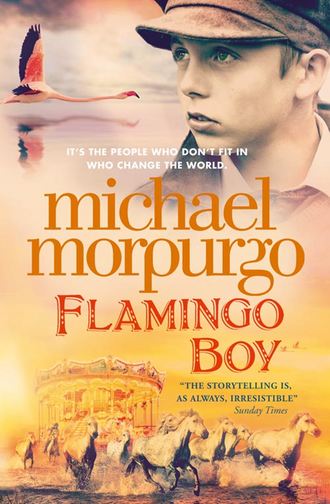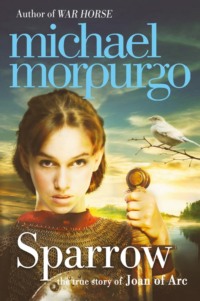
Полная версия
Flamingo Boy
The dog stirred and scratched vigorously, which was when she did look up, and noticed I was awake. She spoke in French, which puzzled me at first. I was still muddle-headed, I suppose, not knowing quite where I was nor how I had got here. For some moments, in my confused state, I just stared at her, until my memories gathered themselves, and fell more into place. I could remember now the walk along the long road to nowhere, the flamingos on either side of me, the pink lakes, my throbbing head, the man carrying me who seemed to be honking like a flamingo.
The woman was speaking English to me now as she put down her writing book and leaned forward. She had a heavy accent, but her English was quite understandable.
“You prefer that I speak English? I hope you will forgive me, but I looked in your bag to find out who you were,” she said. “And I found this, your passport.” She picked it up from the table beside her, to show me, and opened it. “You are Vincent Montague. Yes? A British passport, so you are a British flamingo, non?” She could see I was bewildered at this, and smiled. “Lorenzo, he will be so pleased he found you. Usually, he brings back a French flamingo, or an egret maybe, or a frog or a rabbit, or a terrapin, but they are always French. You are the first British flamingo he has ever brought home!”
I must still have been looking puzzled. She went on to explain. “Lorenzo – Renzo he calls himself – is the one who found you half dead on the road. He likes always to keep an eye out for his flamingos. He loves his flamingos. In spring, he likes to be sure no one is out there stealing their eggs. Very few do these days, but he likes to keep watch, just in case. And now, in summer, there are always fledglings, who sometimes become separated from their mothers, and are too weak to survive. So he is on the lookout for them too. He is out there on the marshes, patrolling most nights. He told me it was the dog who found you – Ami, we call him – which means Friend in English, but I expect you know this. You speak a little French, perhaps?” I shook my head. I knew some French from school, but had never dared to speak it, and I did not want to have to start now.
“It does not matter,” she went on. “You are English – I did not expect anything else. Lorenzo tells me he carried you home. A long way, he said, and you were heavy too, but he is strong. Years of work on the farm, it makes you strong. I have made you soup, and I have some cheese also. And you must drink water, lots of water. Water is the great healer.”
She got up then, and put her notebook down on the table beside her. “I will tell Renzo you are awake.” She came and laid the back of her hand against my forehead. “You are better, but still too hot. Water,” she went on, picking up a glass on the table beside me. “It is empty. You will need more water. Renzo will bring some for you. He is the doctor. You are his patient. I am just the nurse.” She walked away then, calling for him. “Renzo! Renzo!”
I was left alone with Ami, who was a very large brown dog. He sat by my knee now, gazing up at me.
“So it was you who found me,” I said, reaching out rather nervously and patting the top of his head. He was shaggy all over, his dark eyes glinting at me from deep inside his matted fur. “Thank you for finding me,” I said to him. “Merci.”
“Merci merci,” came an echoing voice from the door. The man who stood there filled the doorway. He was holding a glass of water, but he did not seem to want to come into the room, and kept repeating “merci” over and over again. The dog got up and walked over to him, tail high and waving. But he paid it no attention. The man’s eyes were fixed on me, unwavering, unblinking. There was nothing alarming about his gaze. It was steady, not staring. He was scrutinising me, I felt, much in the same way as I was examining him.
Everything about him was long and tall. His arms hung loose at his sides. He had sloping shoulders under his blue jacket, and huge hands, I noticed. There was light in the room only from the flickering fire and from the oil lamp on the table where the woman had been writing, so I could not see his face that well. He did not seem to want to talk, but simply stood there, considering me. I said nothing, because I could not think of anything to say. I turned to gaze into the fire.
The woman with the silver hair came in a while later, carrying a tray. “This is Lorenzo,” she said. “He does not say much. He speaks more with his eyes, don’t you, Renzo?”
“Renzo,” he said, coming slowly towards me. “Renzo Renzo.” He was tapping the side of his head as he spoke; and then, breaking into a sudden loud laugh of delight, he bent down and picked up my hand, but not to shake as I supposed. He lifted it to his nose. He was smelling my hand. His face was close to mine then, his nose almost touching my hair. He was smelling that too, then stroking it, and smelling his own hand afterwards.
“You must not worry. It is how he gets to know people,” the woman explained. “You will find he is friendly to everyone who is kind. And he is never friendly to those who are not. He thinks you are kind, so you must be. Lorenzo is never wrong about people.
“Oh, pardonnez-moi – I am so sorry. I am being most impolite,” she went on. “I am Kezia, Kezia Charbonneau. Lorenzo and I, we are like brother and sister, you could almost say. But we are best friends. Meilleurs amis. We grew up together, and now we look after each other, and the farm, and the flamingos, don’t we? N’est-ce pas, Renzo?”
But this Lorenzo was not listening. He was still occupied totally with examining me, bending over me, his eyes peering deep into mine. I never saw eyes kinder nor more intense than his. He seemed to be seeking out my soul. It was troubling to me at first – no one had ever looked at me like this before. I was unsettled also by the hugeness of his presence so close to me, but there was an overwhelming sense of tenderness about him that banished all fear. He was no threat to me, but he was strange. He seemed like a middle-aged man, but had the open face of a boy.
Kezia set the tray down on the table beside me. The soup smelled wonderful, and there was bread and cheese beside it.
“Eat, Vincent, eat,” she told me. “Mangez.”
“Mangez mangez,” Lorenzo echoed, and lifted his arms slowly, making great wings of them, and then he was honking just like a flamingo.
“This he always does when he is happy,” Kezia said, smiling. I noticed her earrings then, like golden crescent moons they were, shining in the light of the fire. “Sometimes I think he is half Lorenzo, half flamingo,” she went on. “He can walk like them too, talk like them. You will see.”
“Flam flam!” Lorenzo was saying, clapping his hands excitedly. “Flam flam!” And then suddenly he was waving at me, saying goodbye. He turned away, opened the front door and left.
“Before he goes to bed, he has to see his beloved flamingos,” Kezia went on, “the ones he has rescued, mostly young ones, chicks, fledglings. He looks after them in his shed, feeds them. There are other animals in there too. It is like a hospital. He likes to spend a little time there in the evenings with them, to say goodnight. Now, you must eat your soup, Vincent, before it gets cold.”
She sat down again in her chair, watching me and smiling approvingly when she saw how much I was enjoying the soup. It was warming me from the roots of my hair down to my toes.
“You will stay with us until you are strong, Vincent,” she said. “Lorenzo and me, we shall look after you, make you better. To him, you are like one of his lost fledgling flamingos, and to me you are a welcome guest. We shall not put you in his hospital shed, I promise you. He keeps it as clean as he can, but the creatures he looks after in there, they do smell, and you would not like it. You shall stay here in the house, by the fire. Between Lorenzo and me, we shall make you well again, you will see.”
She smiled at me. “Vincent. It is a good name,” she went on. “Français aussi, vous savez. It is a French name also.”
“Where am I?” I asked her, looking about me.
“On a farm,” she told me. “On a farm far out in the marshes, in the middle of nowhere, you could say, a few kilometres down the road, along the canal from a little town called Aigues-Mortes. Do you know this place? Have you been there?”
I shook my head. I was still bewildered, my head full of so many questions. “How come you speak English so well?” I asked her.
“Ah ça, c’est une histoire. That is a story, Vincent, a long story, one that I might tell you when I know you better. First, we have to make you well again. You must have lots of sleep, and peace and quiet. You will stay here with us for a few days and rest.” She reached out and felt my forehead again. “You have a fever still. We shall have you better again, but it will take time. You cannot hurry a fever. No more questions. Sleep well. Dormez bien.”

CHAPTER 5
A Complete Flamingo
I don’t think I had ever been properly ill before this in all my life. I had had a day or two off school with coughs and colds, but mostly with invented illnesses to avoid some lesson or test I didn’t want to have to face. This was different. This was the real thing. My head ached, my legs ached, every part of me ached. I seemed one moment to be shivering uncontrollably with cold, and the next I was pouring with sweat – often both together. Night and day, I hovered on the cusp of sleep. In and out of my dreams, the wind seemed always to be blowing, whistling down the chimney, rattling the windows and shaking the shutters. And whenever I woke it always took some time for me to remember where I was now, what had happened, how I had got here. I still had little idea where I was.
But each day, whenever I woke, the faces I saw around me were becoming more familiar, more reassuring. One of them, either Kezia or Lorenzo, was always nearby, somewhere in the room, keeping an eye on me, waiting for me to wake. And, more often than not, Ami would be lying there by the fire, or would be sitting right by me, eyeing me through his fur. Kezia might be sitting in her chair opposite, mending clothes or writing in her notebook. When Lorenzo was there, he would be close to me, his hand resting often on my hair, his eyes closed. Sometimes I would wake up and find him blowing gently on my forehead, humming softly to me. When he noticed I was awake, or saw my eyes open, he would at once spring to his feet, clapping his hands with delight, calling to Kezia to come. Often, all three were there, waiting for me to wake, and I could feel them willing me well again.
All around me, on the walls, there were photographs. From where I lay, I thought I could recognise Kezia and Lorenzo in some of them, as children. There were other people in the photographs I did not know, other family, I supposed. But many of the photographs were of animals: herds of black bulls and white horses, some sheep too. Most though were of flamingos, large and small, and these were all in colour: flamingos flying across the sky in great flocks, or landing on the water, or standing alone and majestic in the marshes, or sitting on nests, or feeding in the shallows. I longed to be able to get up and look more closely. But I was still too weak to do it on my own. Even going to the toilet, I still needed one of them to steady me, to help me walk across the room.
But I could already feel myself getting better. I did not shiver any more, nor break into cold sweats. I slept less and my energy was beginning to return. I was feeling stronger with every day that passed. I wanted to test my legs, my balance, get myself moving. I was beginning to wander about the room, peer out of the windows, look at the photographs close up, all the while trying to make more sense of my surroundings. The room where I had been lying night and day on my couch was cavernous, with a high, heavily beamed ceiling. It was living room, kitchen, eating room all in one, and sparsely furnished – just my couch, a few chairs, a small table, a blanket for Ami by the fire. Everything was huddled close around the open fireplace, which was the glowing, crackling heart of the room.
There was a small kitchen in one corner, where Kezia was often busy over the stove, or the sink, and beyond the kitchen was the door to the bathroom, the only other room I’d been into. A staircase in the darkest corner of the room led upstairs to where Kezia and Lorenzo went each night, leaving Ami and me to the flickering warmth of the fire. There was no electricity in the house, so far as I could see. The house smelled of oil lamps and burning wood, and of whatever Kezia happened to be cooking on the stove. She made the best soups I had ever tasted, mostly vegetable soups, with potatoes or rice, and there was always bread, crusty, chewy, not at all like the bread at home. I loved it.
Outside, the wind often raged and roared about the house, and, when it did, it was continuous, unrelenting, for a week or more sometimes, and with such ferocity that the house shook. So loud was this wind, this mistral, as Kezia called it, that it was difficult to think straight at all, and sometimes impossible to hear what Kezia was saying in her still, small voice. Lorenzo I could hear better, despite the mistral, because he would often repeat the same word louder and louder for me. But understanding him was difficult. If ever I looked perplexed – and I was often perplexed – he would act out what he meant, which I could see he loved to do. But, even then, much of what he was trying to tell me was beyond my comprehension.
“Flam flam” was one of the things he said that needed no explanation. He spoke it more than any other, and it sometimes provoked in him an extraordinary metamorphosis. “Flam flam,” he would say, and, on the spur of the moment, he would become a flamingo, a living, breathing flamingo, stepping out in long, slow, stiff strides across the room, leaning forward, his neck stretched out, bending to feed, scooping through the shallows, just as I had seen them out on the lakes in the marshes. Then his arms would suddenly open up and become wings, and he would be flying, soaring around the room. Whenever he did this, I would marvel at how such a large man, often so awkward in his mannerisms and movements, could glide about the room with such balletic grace, honking happily, a complete flamingo.
But there were so many other words he kept saying that I could not yet understand at all. He seemed to think that by repeating them louder, his face closer to mine, it might help me understand. I could sense his frustration and disappointment when I did not. So sometimes I would resort to pretending that I knew what he was talking about. But I don’t think I ever fooled him. And anyway I sensed that he did not like me pretending. When she was there, Kezia would often see my difficulty and come to my rescue, interpreting for me. But she was not always around. So the meaning of many of his words remained a mystery to me.
“Rousel”, “grette”, “Capo”, “Val”, “Lot Lot” – these were just some of the words that he used, many of them quite often, words he clearly longed for me to understand. I could see he liked it when I repeated the words back to him. That was what made him happy. So that’s what I did. He liked me to be an echo. And I also learned early on with Lorenzo that he liked truth, that for him pretending between people, unless it was for fun, was not truthful, and that upset him.
It took a while for me to begin to understand this strange, awkward man, who seemed to live so much of every day in a world of his own. He was like no one I had ever encountered before. He joined our world – the real world as we like to think of it – and left it as and when he felt like it. Everything he did was both spontaneous and meant. His words and his ways were his own. I was getting used to his language, his moaning, or groaning, or humming, to his sudden shrieks and shouts of exuberance, his bursts of laughter and clapping. I noticed that Ami, if he could, would follow Lorenzo everywhere he went, walking at his heels. Unlike me, he seemed to understand every word Lorenzo spoke, every gesture and grunt. Kezia too, I could see, understood him instinctively. I envied the closeness between the three of them, the complete understanding and trust. I felt an outsider sometimes, but they never treated me as such.
Lorenzo had his own way of ending the day. He would be gone for an hour or so out on the farm, saying goodnight to the animals in his hospital, I presumed, or patrolling the marshes, looking for waifs and strays. When he came in, he rarely sat down at all, even to eat, but liked to stay in the room with us while we did. He would stand, watching the fire in silence, usually nibbling on a piece of sausage – he ate almost nothing else but sausage. When the moment came that he decided to go to bed, it always took me by surprise, even though I was expecting it. He would turn away from us, stop to crouch down for a while over Ami, touch him on his head, give him the last of his sausage, then, with a wave of his hand, walk very deliberately towards the stairs. As he went, he would lift his arms, make wide beating wings of them, and make his way upstairs, honking his farewell.
Kezia and I would sit and talk by the fire, or sit together for a while in comfortable silence. I was by now much less tired than I had been.
There was so much I wanted to ask her, about Lorenzo especially, but also about the photographs on the walls too, who everyone in them was, how the two of them had come to be living here together. I had asked her once about how she had learned to speak English, but still she had not told me. I was longing to find out. I was intrigued about everything, and I knew that time was short. Now I was up and about a bit more – though I was not yet allowed outside in that wind – I would soon have to think about leaving. I did not want to have to say goodbye before finding answers to all the whys and wherefores in my head.
I had asked her more than once as well about the photographs on the walls, who everyone was, but Kezia simply said they were family, and would say nothing else. I felt that to ask again might be to intrude and upset her, and, after all she and Lorenzo had done for me, I did not want to do that.

CHAPTER 6
How it Was, How We Were
As it turned out, I never had to ask her at all. One evening, as we were sitting there by the fire, just after Lorenzo had gone up to bed, Kezia started asking me questions. “Alors, Vincent. You must tell me something about yourself,” she said suddenly, quite unexpectedly. “In England, en Angleterre, where do you live? Have you any brothers or sisters at home? I know nothing about you. What have you been studying, Vincent? And what were you doing, by the way, wandering through the Camargue in the middle of the night? This I have always wanted to know.”
I kept it short, told her only the essentials. I told her about home, about the boat picture on the wall in my bedroom, about how it had fallen off and nearly killed me, and the letter from my grandparents I had discovered on the back, about Vincent van Gogh and the Camargue, about my horrible exams, about how, once they were over, I had said goodbye to my mother, walked out of the door, rucksack on my back, free as a bird, and found my way down to the Camargue.
Her eyes, I noticed, lit up when I told her that. “Bravo! I see you have the Roma spirit in you,” she said. “You are a wanderer, a traveller. I like that. And now that you have answered my questions, and I feel I know you a little better, maybe it is time for me to answer your question.”
I did not know which question she meant. There were so many I wanted to ask by now. I must have looked rather blank.
“Vincent, you do not remember? You asked me how I learned to speak English so well. Maybe you do not wish to know?”
“No, no, please, I want to hear,” I told her.
She sat back in her chair, hitched her shawl up around her shoulders, and looked across at me. “So much of everything that happens to us, Vincent, that makes our lives what they are, is just pure chance – le hasard, as we say in French. The families and times we are born into, the places we live. All chance. Think of it. Think of what happened to you. Because a picture falls off a wall, you find yourself wandering down a dark road to nowhere through the marshes of the Camargue, and you get sick, and Lorenzo happens to be out there with Ami on one of his evening patrols, looking for any abandoned fledgling flamingos, and they find you half dead on the road, and bring you here. So here you are, and here I am, with Ami, and Lorenzo. C’est le hasard, Vincent, just chance.
“You know what they called Lorenzo when he was little, when I was little too, when I first knew him? Flamingo Boy. En fait, some people still do. You can understand why, I think. Lorenzo and me, we grew up here on this farm, together. We have known each other for almost all our lives. We were best friends from the day we met. And there was a very good reason for that. Lorenzo was different. I was different. It is not easy growing up different, not then, not now.”
“I was wondering about that,” I said. “I mean about Lorenzo’s … well, about Lorenzo’s difference.”
“Listen, Vincent.” She was reprimanding me now, with a frown and a wagging finger. “If you go on interrupting, I shall never even begin my story, let alone finish it, or I shall fall asleep telling it. You want to know everything, about Lorenzo, about us, about this farm. I understand that. You told me your story, which was quite short, but very interesting. So I shall tell you ours – that is only fair. But we are much older than you, both of us, and therefore it will take longer. I know from your passport you are just eighteen. Lorenzo and I, as I told you, we are the wrong side of fifty. So mine will be a longer story. Alors, Vincent, no more questions. Let me just tell you how it was, how we were, why I speak English, and why you find us together in this place.
“It is a little cold tonight. It is uncomfortable weather. Too hot in the day, and cold at night. Put a log or two on the fire, Vincent, and then just lie back, be quiet and listen. No more interruptions, agreed? D’accord?”
I did as I was told. Ami settled down to listen beside me, his eyes, and mine, never leaving Kezia, as she looked into the fire and began.
“Renzo, Lorenzo Sully, was born upstairs, here in this farmhouse in the summer of 1932, on May the twenty-eighth. I remember this date rather well because I was born on the very same day, but not here. I was born thirty kilometres away, down by the sea. I am not sure exactly where, because being Roma people, travelling people – gypsies they call us in English, I think – my family was always on the move. So I was not to be part of Lorenzo’s story until a few years later. We were not to meet until we were nine years old. Until then, I was travelling here, there and everywhere, with Maman and Papa, in our caravan, setting up our carousel whenever and wherever they wanted us, on saints’ days and holidays, at fairs and festivals in villages and towns all over the Camargue. That was our life.
Meanwhile, Lorenzo was growing up here on the farm with Nancy and Henri Sully, his maman and papa. They bred white horses, and black bulls, and kept some sheep too, for their wool and their meat and their cheese. They had speckled hens for their eggs. They gathered herbs from the countryside all around, and they fished in the lakes and streams and canals. And there were frogs there too. They had bees for honey. They grew some rice, potatoes and beans, and also corn to feed the black bulls through the winter. It is only a small farm, about fifty hectares, and they did all the work themselves.










